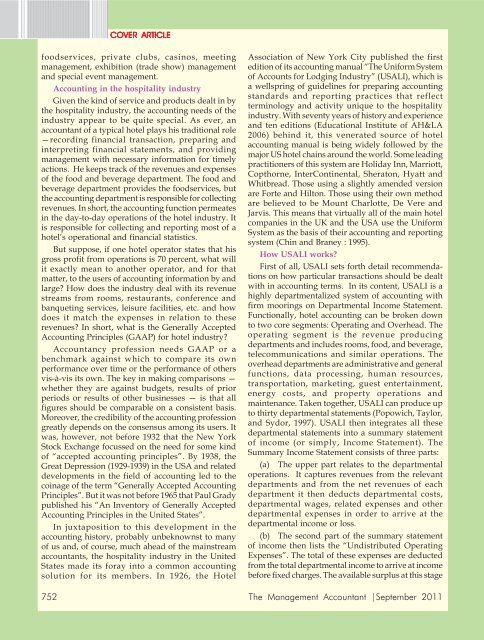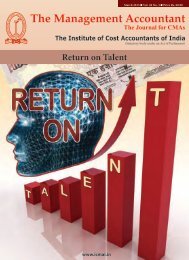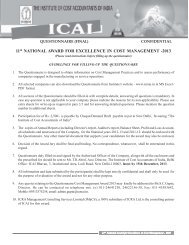This Issue - Icwai
This Issue - Icwai
This Issue - Icwai
You also want an ePaper? Increase the reach of your titles
YUMPU automatically turns print PDFs into web optimized ePapers that Google loves.
COVER COVER ARTICLE<br />
ARTICLE<br />
foodservices, private clubs, casinos, meeting<br />
management, exhibition (trade show) management<br />
and special event management.<br />
Accounting in the hospitality industry<br />
Given the kind of service and products dealt in by<br />
the hospitality industry, the accounting needs of the<br />
industry appear to be quite special. As ever, an<br />
accountant of a typical hotel plays his traditional role<br />
—recording financial transaction, preparing and<br />
interpreting financial statements, and providing<br />
management with necessary information for timely<br />
actions. He keeps track of the revenues and expenses<br />
of the food and beverage department. The food and<br />
beverage department provides the foodservices, but<br />
the accounting department is responsible for collecting<br />
revenues. In short, the accounting function permeates<br />
in the day-to-day operations of the hotel industry. It<br />
is responsible for collecting and reporting most of a<br />
hotel’s operational and financial statistics.<br />
But suppose, if one hotel operator states that his<br />
gross profit from operations is 70 percent, what will<br />
it exactly mean to another operator, and for that<br />
matter, to the users of accounting information by and<br />
large? How does the industry deal with its revenue<br />
streams from rooms, restaurants, conference and<br />
banqueting services, leisure facilities, etc. and how<br />
does it match the expenses in relation to these<br />
revenues? In short, what is the Generally Accepted<br />
Accounting Principles (GAAP) for hotel industry?<br />
Accountancy profession needs GAAP or a<br />
benchmark against which to compare its own<br />
performance over time or the performance of others<br />
vis-à-vis its own. The key in making comparisons —<br />
whether they are against budgets, results of prior<br />
periods or results of other businesses — is that all<br />
figures should be comparable on a consistent basis.<br />
Moreover, the credibility of the accounting profession<br />
greatly depends on the consensus among its users. It<br />
was, however, not before 1932 that the New York<br />
Stock Exchange focussed on the need for some kind<br />
of “accepted accounting principles”. By 1938, the<br />
Great Depression (1929-1939) in the USA and related<br />
developments in the field of accounting led to the<br />
coinage of the term “Generally Accepted Accounting<br />
Principles”. But it was not before 1965 that Paul Grady<br />
published his “An Inventory of Generally Accepted<br />
Accounting Principles in the United States”.<br />
In juxtaposition to this development in the<br />
accounting history, probably unbeknownst to many<br />
of us and, of course, much ahead of the mainstream<br />
accountants, the hospitality industry in the United<br />
States made its foray into a common accounting<br />
solution for its members. In 1926, the Hotel<br />
Association of New York City published the first<br />
edition of its accounting manual “The Uniform System<br />
of Accounts for Lodging Industry” (USALI), which is<br />
a wellspring of guidelines for preparing accounting<br />
standards and reporting practices that reflect<br />
terminology and activity unique to the hospitality<br />
industry. With seventy years of history and experience<br />
and ten editions (Educational Institute of AH&LA<br />
2006) behind it, this venerated source of hotel<br />
accounting manual is being widely followed by the<br />
major US hotel chains around the world. Some leading<br />
practitioners of this system are Holiday Inn, Marriott,<br />
Copthorne, InterContinental, Sheraton, Hyatt and<br />
Whitbread. Those using a slightly amended version<br />
are Forte and Hilton. Those using their own method<br />
are believed to be Mount Charlotte, De Vere and<br />
Jarvis. <strong>This</strong> means that virtually all of the main hotel<br />
companies in the UK and the USA use the Uniform<br />
System as the basis of their accounting and reporting<br />
system (Chin and Braney : 1995).<br />
How USALI works?<br />
First of all, USALI sets forth detail recommendations<br />
on how particular transactions should be dealt<br />
with in accounting terms. In its content, USALI is a<br />
highly departmentalized system of accounting with<br />
firm moorings on Departmental Income Statement.<br />
Functionally, hotel accounting can be broken down<br />
to two core segments: Operating and Overhead. The<br />
operating segment is the revenue producing<br />
departments and includes rooms, food, and beverage,<br />
telecommunications and similar operations. The<br />
overhead departments are administrative and general<br />
functions, data processing, human resources,<br />
transportation, marketing, guest entertainment,<br />
energy costs, and property operations and<br />
maintenance. Taken together, USALI can produce up<br />
to thirty departmental statements (Popowich, Taylor,<br />
and Sydor, 1997). USALI then integrates all these<br />
departmental statements into a summary statement<br />
of income (or simply, Income Statement). The<br />
Summary Income Statement consists of three parts:<br />
(a) The upper part relates to the departmental<br />
operations. It captures revenues from the relevant<br />
departments and from the net revenues of each<br />
department it then deducts departmental costs,<br />
departmental wages, related expenses and other<br />
departmental expenses in order to arrive at the<br />
departmental income or loss.<br />
(b) The second part of the summary statement<br />
of income then lists the “Undistributed Operating<br />
Expenses”. The total of these expenses are deducted<br />
from the total departmental income to arrive at income<br />
before fixed charges. The available surplus at this stage<br />
752 The Management Accountant |September 2011




